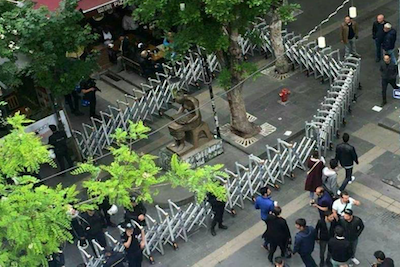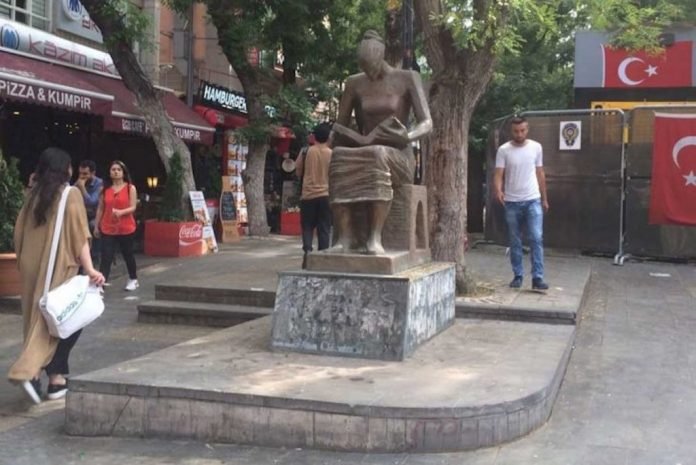A statue representing human rights at the heart of Turkey’s capital city of Ankara was finally “released” on Thursday after being surrounded by police barricades for 14 months.
On one of Ankara’s busiest streets stands a bronze statue of a woman holding a human rights declaration in her hand. Police in the Turkish capital guarded the monument round the clock after becoming the focal point of hunger strikes by people who had lost their jobs in state of emergency decrees. No one was allowed to approach it, and photos and videos were forbidden. Police said the monument has been barricaded for security reasons.

“As of today, the Human Rights Monument, which has been surrounded by barriers for 430 days, is now free. The barriers that surrounded the monument for months were removed today,” journalist Hayri Demir tweeted.
The Turkish government’s targeting of a human rights statue in Ankara is a “reflection of the fascism in our country,” Germany’s influential media outlet Deutsche Welle (DW) had quoted a previously jailed teacher as saying “One year ago, Turkish police erected barriers around a monument in Ankara dedicated to human rights. The statue has become a symbol of the country’s state of emergency — and the erosion of human rights it brings.”
The statue was erected in 1990, and people of all political convictions have gathered there ever since. It has been a meeting point for protests and a place to address the media. It was a gathering point for Ankara citizens during İstanbul’s 2013 Gezi Park protests, too.
Things changed after a controversial coup on June 15, 2016. Academic Nuriye Gülmen and grade school teacher Semih Özakça were among the thousands of people who lost their jobs. They spent months after their dismissals sitting beside the Ankara human rights monument, demanding that they be reinstated to their jobs. On May 23, 2017 police cordoned off the bronze figure with a metal barrier and arrested Gülmen and Özakça.
Daily protests followed, which the police countered with violent force that was documented on social media. Protesters were detained in the morning and let go in the evening. Ankara’s governor declared the barriers a ‘security measure’ stemming from Turkey’s state of emergency.
Turkish sculptor Metin Yurdanur gifted the bronze figure to Ankara’s Çankaya district 28 years ago.
Turkey survived a controversial military coup attempt on July 15, 2016 that killed 249 people. Immediately after the putsch, the Justice and Development Party (AKP) government along with President Recep Tayyip Erdoğan pinned the blame on the Gülen movement.
Fethullah Gülen, who inspired the movement, strongly denied having any role in the failed coup and called for an international investigation into it, but President Erdoğan — calling the coup attempt “a gift from God” — and the government initiated a widespread purge aimed at cleansing sympathizers of the movement from within state institutions, dehumanizing its popular figures and putting them in custody.
Turkey has suspended or dismissed about 170,000 judges, teachers, police and civil servants since July 15, 2016. On December 13, 2017 the Justice Ministry announced that 169,013 people have been the subject of legal proceedings on coup charges since the failed coup.
Turkish Interior Minister Süleyman Soylu announced on April 18, 2018 that the Turkish government had jailed 77,081 people between July 15, 2016 and April 11, 2018 over alleged links to the Gülen movement.















